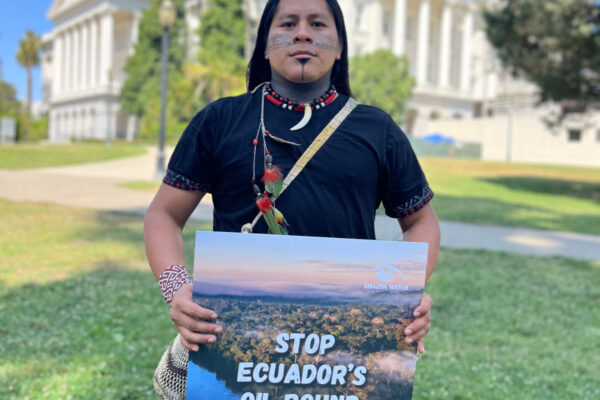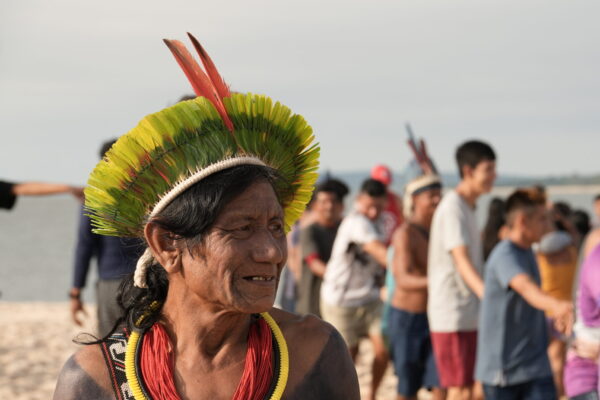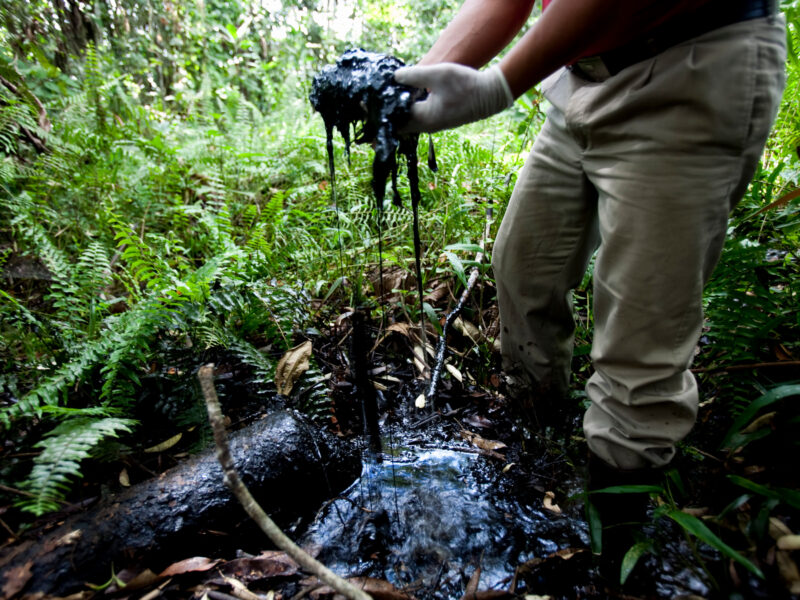Eleven years ago, frustrated by the racist and dismissive responses from Chevron executives at its Annual General Meeting, affected communities decided to take a different approach. Instead of attending the meeting hoping to be heard by Chevron’s board and management, they declared their solidarity as “Anti-Chevron” in the week leading up to the meeting.
On the first Anti-Chevron Day in 2014, actions took place in 20 nations across five continents. It remains the only annual global day of action targeting a single oil company. Chevron deserves this distinction even more than other fossil fuel polluters. It is not only the worst greenhouse gas emitter among investor-owned oil companies, but it also relentlessly and unethically attacks its victims when they stand up to the company.
On any list of worst corporate actors concerning human rights, the environment, accountability, transparency, and governance, Chevron consistently ranks at or near the top.
Chevron is responsible for the world’s worst oil-related environmental disaster, deliberately dumping over 60 billion gallons of cancer-causing oil waste into the Ecuadorian Amazon over decades as a cost-saving measure. In 2011, Chevron was found liable for $9.5 billion, based largely on its own evidence, to cover clean-up and health care costs for affected peoples. However, Chevron has never paid any of that judgment. Instead, it weaponized the U.S. judicial system, with its “fossil fuel mob lawyers” at Gibson, Dunn & Crutcher, to orchestrate a massive SLAPP suit denying the people of Ecuador access to justice and ultimately criminalizing human rights attorney Steven Donziger. This tactic has become a playbook for other corporate actors with no hope of winning their cases on merit, posing a serious threat to human rights, environmental protection, and free speech.
And this is just Ecuador. Chevron owes over $50 billion globally to communities it has harmed and nations whose laws it has violated, and it is implicated in some of the worst human rights crimes imaginable. It is no surprise that the Anti-Chevron movement has not only persisted but expanded.
As the movement to call for a ceasefire and end to violence in Palestine grows, Chevron has been exposed and is the target of a global boycott campaign. As a consequence, Anti-Chevron Month events supported the global boycott campaign against Chevron for its significant role in fueling the ongoing occupation of Palestine through its ownership and partial operation of the Tamar and Leviathan gas fields off the coast of Gaza.
This year, May was declared “Anti-Chevron Month,” and events have already taken place leading up to the Chevron shareholder meeting scheduled for May 29.
- May 5: the Rich City Rays – kayaktivists from Richmond, California carried out a non-violent direct action on the San Francisco Bay stopping an oil tanker headed to the Chevron-Richmond refinery.
- May 15: the Union of Peoples Affected by Chevron in Ecuador (UDAPT) held a candlelight vigil and film screening about the international campaign to boycott Chevron for its support of genocide and apartheid in Palestine.
- May 16: UDAPT coordinated an academic forum to discuss and further support the NO vote on a national referendum that passed in April – a direct rejection of Chevron’s attempts to abuse the Investor-State Dispute Settlement system to escape justice in Ecuador.
- May 19: a coalition of over 30 San Francisco Bay Area organizations held an event, “From Richmond to Palestine, a Community Gathering for Global Solidarity.” Hundreds of people participated and sent their message to international press only a few days prior to Chevron’s AGM. Spokespeople discussed Chevron violations in Richmond, Ecuador, Palestine, Myanmar, Philippines, Nigeria, and elsewhere.
- May 20: a virtual forum was held in Ecuador and online specifically to strengthen international solidarity for Palestine.
- May 21: UDAPT held a press conference – “Anti-Chevron Day: Resistance to Corporate Impunity”
- May 21: Oil Change International released a new report “Big Oil Reality Check: Aligned in Failure” analyzing Chevron’s climate and sustainability pledges and plans. They found Chevron’s climate pledges and plans are “Grossly Insufficient” across every criteria they had.
- Upcoming on May 29 at the Chevron AGM, the “American Baptist Home Mission Society” (part of the group Investor Advocates for Social Justice) have introduced a shareholder resolution calling on Chevron management to “commission an independent third-party report” evaluating its human rights policy and efforts to prevent, mitigate, and remedy actual and potential human rights impacts of its operations. They reference the independent report Chevron’s Global Destruction and the fact that “Chevron continues to deny responsibility for a $9.5 billion judgment against the company for decades of contamination in Ecuador.” As well as, “Chevron’s subsequent drawn-out legal and reputational attacks on Ecuadorian plaintiffs’ attorney, Steven Donziger.”
From Ecuador, the affected communities, represented by UDAPT, remain “Anti-Chevron” and call for more international solidarity this Anti-Chevron Month:
“Chevron deliberately dumped more than 60 billion gallons of toxic oil waste into our communities for decades and caused a massive health crisis. Thousands have already died and we continue to live in the midst of Chevron’s contamination. This is because the company and their executives refuse to pay for a cleanup. Meanwhile, they make billions of dollars in profits every year and use that money to attack us and say we are criminals. And when they tell you that in order for the industry to grow, someone has to sacrifice, it is a fact that they are not the ones who sacrifice. The ones who sacrifice are the people who live on the sites, the ones who are directly impacted by all this. They call us a sacrifice zone. If we really want to put an end to all this, we have to start by first of all putting an end to this camouflaged racism that comes from the big corporations.
“That is why we will remain anti-Chevron and stand in solidarity with every community affected by Chevron. We will never stop fighting for justice for everyone harmed by this company. That is why we first declared Anti-Chevron Day in 2014 and we call on the international community to stand with us until justice is served and Chevron is held accountable.”
Donald Moncayo, President of UDAPT
All of these campaigns challenging Chevron will continue past May, of course. Solidarity with communities affected by Chevron and the fossil fuel industry is a critical element in the movement for climate justice.












